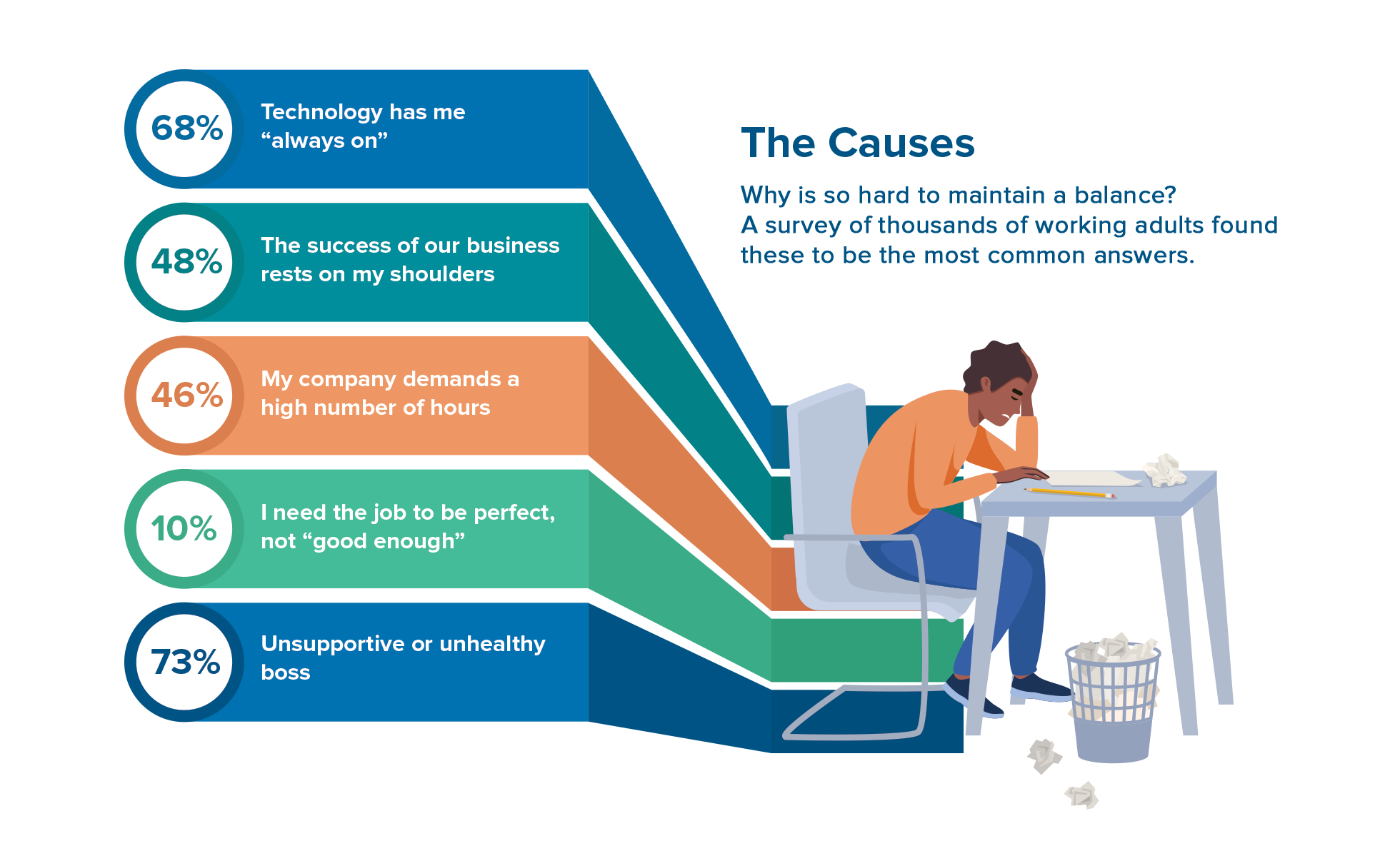In today's fast-paced, interconnected world, the lines between work and personal life are often blurred. Technological advances have facilitated instant communication and constant accessibility, inadvertently causing disruptions to the delicate work-life balance.
This article explores the significance of boundaries in maintaining work-life balance and its impact on mental health. It also discusses the benefits, risks, and factors that companies should consider when aiming to cultivate a culture that fosters mental well-being.
The Work-Life Balance Conundrum
 Work-life balance essentially involves maintaining a harmonious equilibrium between professional obligations and personal commitments. A balanced work-life scenario ensures that individuals allocate equal importance to their career and personal growth, resulting in improved productivity and enhanced personal satisfaction.
Work-life balance essentially involves maintaining a harmonious equilibrium between professional obligations and personal commitments. A balanced work-life scenario ensures that individuals allocate equal importance to their career and personal growth, resulting in improved productivity and enhanced personal satisfaction.
However, the rise of digital connectivity has created an "always-on" culture, pushing this balance into disarray. This imbalance leads to chronic stress, burnout, decreased productivity, and a host of mental health issues that can have long-term implications.
The Mental Health Impact of Work-Life Imbalance

 A lack of work-life balance can contribute to chronic stress, anxiety, depression, and burnout. These mental health issues can have severe repercussions on an individual's overall well-being, affecting personal relationships, physical health, and productivity. Moreover, employees experiencing mental health problems are more likely to take sick leave, leading to increased absenteeism and decreased performance at work.
A lack of work-life balance can contribute to chronic stress, anxiety, depression, and burnout. These mental health issues can have severe repercussions on an individual's overall well-being, affecting personal relationships, physical health, and productivity. Moreover, employees experiencing mental health problems are more likely to take sick leave, leading to increased absenteeism and decreased performance at work.
Benefits of Work-Life Balance
There are numerous benefits when companies start to promote having a work-life balance and some of them are listed below:
Improved Mental Health
 An environment that nurtures and emphasizes the importance of work-life balance plays a vital role in mitigating the detrimental effects of stress and anxiety. The concept of a balanced work-life environment isn't merely about dividing professional and personal hours equally. Rather, it's a comprehensive approach that promotes a more harmonious integration of work duties and personal commitments, facilitating the ability for individuals to transition smoothly between these two vital aspects of their lives.
An environment that nurtures and emphasizes the importance of work-life balance plays a vital role in mitigating the detrimental effects of stress and anxiety. The concept of a balanced work-life environment isn't merely about dividing professional and personal hours equally. Rather, it's a comprehensive approach that promotes a more harmonious integration of work duties and personal commitments, facilitating the ability for individuals to transition smoothly between these two vital aspects of their lives.
Enhanced Productivity
 Individuals in the workforce who successfully manage to achieve a harmonious balance between their professional responsibilities and personal life often exhibit heightened levels of engagement within their roles. By maintaining this balance, they are able to direct their focus more effectively toward their tasks, leading to an increase in their overall productivity. This also allows them to approach work with a clear, uncluttered mind, ultimately enabling them to perform more efficiently and contribute more meaningfully to the workplace.
Individuals in the workforce who successfully manage to achieve a harmonious balance between their professional responsibilities and personal life often exhibit heightened levels of engagement within their roles. By maintaining this balance, they are able to direct their focus more effectively toward their tasks, leading to an increase in their overall productivity. This also allows them to approach work with a clear, uncluttered mind, ultimately enabling them to perform more efficiently and contribute more meaningfully to the workplace.


 Work-life balance essentially involves maintaining a harmonious equilibrium between professional obligations and personal commitments. A balanced work-life scenario ensures that individuals allocate equal importance to their career and personal growth, resulting in improved productivity and enhanced personal satisfaction.
Work-life balance essentially involves maintaining a harmonious equilibrium between professional obligations and personal commitments. A balanced work-life scenario ensures that individuals allocate equal importance to their career and personal growth, resulting in improved productivity and enhanced personal satisfaction.
 An environment that nurtures and emphasizes the importance of work-life balance plays a vital role in mitigating the detrimental effects of stress and anxiety. The concept of a balanced work-life environment isn't merely about dividing professional and personal hours equally. Rather, it's a comprehensive approach that promotes a more harmonious integration of work duties and personal commitments, facilitating the ability for individuals to transition smoothly between these two vital aspects of their lives.
An environment that nurtures and emphasizes the importance of work-life balance plays a vital role in mitigating the detrimental effects of stress and anxiety. The concept of a balanced work-life environment isn't merely about dividing professional and personal hours equally. Rather, it's a comprehensive approach that promotes a more harmonious integration of work duties and personal commitments, facilitating the ability for individuals to transition smoothly between these two vital aspects of their lives. Individuals in the workforce who successfully manage to achieve a harmonious balance between their professional responsibilities and personal life often exhibit heightened levels of engagement within their roles. By maintaining this balance, they are able to direct their focus more effectively toward their tasks, leading to an increase in their overall productivity. This also allows them to approach work with a clear, uncluttered mind, ultimately enabling them to perform more efficiently and contribute more meaningfully to the workplace.
Individuals in the workforce who successfully manage to achieve a harmonious balance between their professional responsibilities and personal life often exhibit heightened levels of engagement within their roles. By maintaining this balance, they are able to direct their focus more effectively toward their tasks, leading to an increase in their overall productivity. This also allows them to approach work with a clear, uncluttered mind, ultimately enabling them to perform more efficiently and contribute more meaningfully to the workplace.

